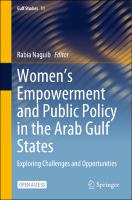Women's Empowerment and Public Policy in the Arab Gulf States
Exploring Challenges and Opportunities
| dc.contributor.editor | Naguib, Rabia | |
| dc.date.accessioned | 2024-01-15T16:47:08Z | |
| dc.date.available | 2024-01-15T16:47:08Z | |
| dc.date.issued | 2024 | |
| dc.identifier | ONIX_20240115_9789819960064_68 | |
| dc.identifier | OCN: 1416153504 | |
| dc.identifier.uri | https://library.oapen.org/handle/20.500.12657/86968 | |
| dc.description.abstract | This open access book explores the various dimensions of women’s empowerment in public policy in the Gulf Cooperation Council (GCC) region, with a particular focus on Qatar, comparing the country to the other Gulf states. Through its rich compilation of empirical qualitative research, the text unpacks the various ways in which women’s empowerment materializes in the GCC context, providing insights into public policy perspectives in high-income rentier states more broadly. The Arab world has long been part of the global dialogue on women’s economic and political empowerment and the GCC has, over the past decade, situated women’s empowerment amongst their respective national priorities and long-term strategies. In turn, the Gulf has seen gradual implementation of policies aimed at women, specifically, in looking to attract and retain them in the labour market, and in the public sector more broadly. The collection surveys and evaluates the progress made in recent decades, paying close attention to the cultural and policy constraints still limiting women’s empowerment in the Gulf. With a key linkage to SDG5, this book is a timely text addressing the context and drivers behind policies centering on women in the Arab region, in its analysis of the interplay of international women’s empowerment discourse and regional public policy decisions. It is relevant to researchers and policy makers focused on women and gender issues in relation to social, cultural, economic, and political empowerment in the Gulf specifically, but also in the Arab world and beyond. ; This open access book explores the various dimensions of women’s empowerment in public policy in the Gulf Cooperation Council (GCC), with a particular focus on Qatar, comparing the country to the other Gulf states. Through its rich compilation of empirical qualitative research, the text unpacks the various ways in which women’s empowerment materializes in the GCC context, providing insights into public policy perspectives in high-income rentier states more broadly. The Arab world has long been part of the global dialogue on women’s economic and political empowerment and the GCC has, over the past decade, situated women’s empowerment amongst their respective national priorities and long-term strategies. In turn, the Gulf has seen gradual implementation of policies aimed at women, specifically, in looking to attract and retain them in the labour market, and in the public sector more broadly. The collection surveys and evaluates the progress made in recent decades, paying close attention to the cultural and policy constraints still limiting women’s empowerment in the Gulf. With a key linkage to SDG5, this book is a timely text addressing the context and drivers behind policies centering on women in the Arab region, in its analysis of the interplay of international women’s empowerment discourse and regional public policy decisions. It is relevant to researchers and policy makers focused on women and gender issues in relation to social, cultural, economic, and political empowerment in the Gulf specifically, but also in the Arab world and beyond. | |
| dc.language | English | |
| dc.relation.ispartofseries | Gulf Studies | |
| dc.subject.classification | bic Book Industry Communication::J Society & social sciences::JF Society & culture: general::JFS Social groups::JFSJ Gender studies, gender groups | |
| dc.subject.classification | bic Book Industry Communication::J Society & social sciences::JP Politics & government::JPP Public administration | |
| dc.subject.classification | bic Book Industry Communication::J Society & social sciences::JH Sociology & anthropology::JHB Sociology::JHBK Sociology: family & relationships | |
| dc.subject.classification | bic Book Industry Communication::L Law::LN Laws of Specific jurisdictions::LNH Employment & labour law | |
| dc.subject.classification | bic Book Industry Communication::K Economics, finance, business & management::KC Economics::KCF Labour economics | |
| dc.subject.other | Public Policy and Women Empowerment in the Gulf | |
| dc.subject.other | Women and Work in Qatar | |
| dc.subject.other | Maqasid Approach to Women Empowerment | |
| dc.subject.other | Public Sector and Empowering Women in Qatar | |
| dc.subject.other | Public Sector and Empowering Women in the GCC | |
| dc.subject.other | Family and Labour Economics | |
| dc.subject.other | Gender, Family and Society | |
| dc.subject.other | Gender in Law and Policy | |
| dc.title | Women's Empowerment and Public Policy in the Arab Gulf States | |
| dc.title.alternative | Exploring Challenges and Opportunities | |
| dc.type | book | |
| oapen.identifier.doi | 10.1007/978-981-99-6006-4 | |
| oapen.relation.isPublishedBy | 6c6992af-b843-4f46-859c-f6e9998e40d5 | |
| oapen.relation.isFundedBy | b09c7c3f-78aa-4f39-8a9e-1ba09e989f0b | |
| oapen.relation.isbn | 9789819960064 | |
| oapen.relation.isbn | 9789819960057 | |
| oapen.imprint | Springer Nature Singapore | |
| oapen.series.number | 11 | |
| oapen.pages | 210 | |
| oapen.place.publication | Singapore | |
| oapen.grant.number | [...] |

